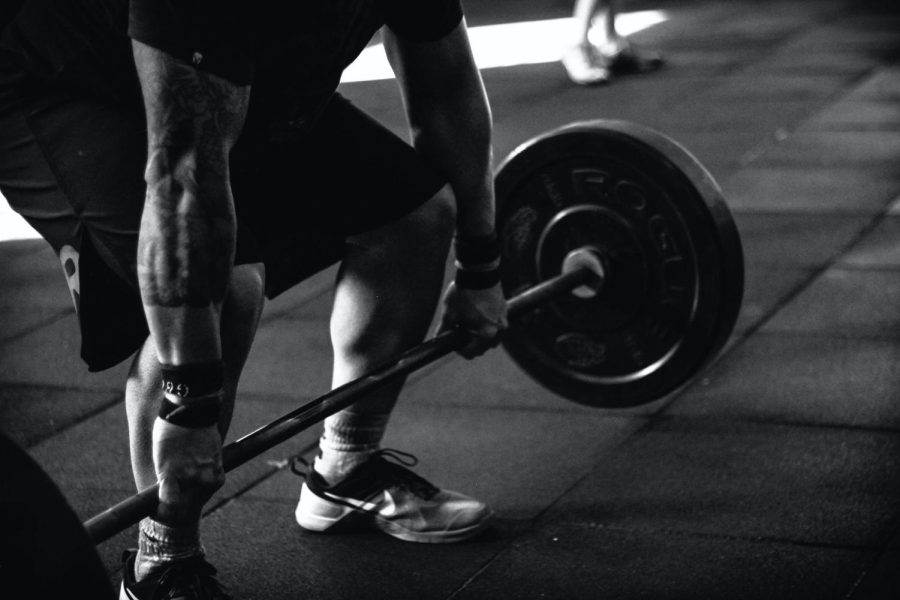Langley: Young People Should Stay Away From Competitive Bodybuilding
January 25, 2023
In high school, I was friends with a lot of athletes. The football, track and wrestling teams were filled with people I called friends. Most of them genuinely benefitted from their time in sports. But unfortunately, I can’t say the same for those who participated in competitive bodybuilding.
After months of hardcore preparation, dozens of students, primarily minors, would get up on stage in front of hundreds of their peers covered in more spray tan than clothing. Adult teachers and school-affiliated coaches then judged their bodies based on aesthetics and definition.
The lengths many young people take to attain their physique are often extreme and dangerous for their health. Bodybuilding can also adversely affect their mental health and lead them into misled, hateful communities.
For these reasons and more, young people should avoid getting into the competitive bodybuilding scene.
The Potential Body-Breaking Effects of Bodybuilding
While weightlifting is exceptionally beneficial for one’s health, bodybuilding takes it to another level. Competitive bodybuilders aim to have abnormally aesthetic and large bodies, with less of a focus on fitness and overall health.
The practice of striving for such abnormality can lead to many health issues. Besides the training injuries common in most strength training disciplines, excessive lifting puts you at risk of aortic tears, which can be fatal. Exorbitant and mismanaged diets can also deprive bodybuilders of essential vitamins and nutrients.
Many supplements, both legal and controlled, have detrimental effects on the body when used in excess. Pre-workout supplements, for example, are often filled with caffeine and other performance-enhancing additives. Besides the risk of over-caffeinating yourself, pre-workout can become poisonous in large doses and cause, in the majority of users, adverse side effects. Dry scooping, a TikTok trend that promotes the practice of taking pre-workout powder without water, can greatly inhibit one’s overall health.
“Bigorexia” and Other Mental Health Effects
While exercising can improve self-esteem and offer some relief from body dysmorphia, bodybuilding causes the exact opposite. Bigorexia is a term borrowed from anorexia nervosa and is used to describe muscle dysmorphia found primarily in male bodybuilders. Athletes suffering from this condition often view themselves as smaller or weaker than they are, regardless of their physical gains. Other symptoms of this condition range from depression and over-compulsivity to irritability. While research on the condition is currently limited, participating in competitive bodybuilding increases one’s likelihood of developing bigorexia.
Additionally, bodybuilding can lead to the development of eating disorders. Bryan Calderon, a young athlete who went to dangerous extremes to achieve a better physique, expressed his struggles with eating disorders during that time. While cutting — a period wherein one has a calorie deficit alongside strength training — Bryan said, “My average net worth of calories every day for four months straight was 400 calories a day.” For context, this amount is less than half of the safe minimum for a calorie deficit. He also would “run about five miles every day with two layers of sweatpants, an undershirt, a shirt, long sleeve over the shirt and a hoodie” to burn the most calories.
This behavior began taking a toll on Bryan’s health. One morning, he explained he “couldn’t stand for 30 minutes” after his leg gave out from underneath him. Before competitions, this sort of behavior was common among young bodybuilders. Limiting their caloric intake to the equivalent of “a cheese stick and yogurt,” they would lose fat rapidly while running every day. However, it didn’t stop there. Bryan witnessed some bodybuilders fasting for days before a show to stop them from bloating. Nearing the end of the discussion, Bryan placed the cause of this fanatical devotion to the physique as a “form of self-harm” and encouraged others to help themselves through therapy instead.
Competitive Bodybuilding and its Terrible Culture
With political extremism and misinformation on the rise, young people must be careful where they source their information or find a community. The competitive bodybuilding scene is one of these dangerous communities.
While not unique to bodybuilding, there exists a right-wing pipeline within the extreme strength-training community. In many western countries, far-right groups devoted to white supremacy, fascism and neo-nazism rose in popularity during the pandemic through online fitness groups and forums. Such groups, such as the American white supremacist Rise Above Movement, often used the guise of self-improvement via weightlifting as a recruitment strategy. This group was associated with the infamous Unite the Right rally and other European Nationalists.
Outside of politics, some bodybuilding figures and influencers have forged their careers off the spread of misinformation and poor advice. Besides the previously mentioned dry-scooping trend, creators like those of the Liver King show the disastrous state of this community. While lying about his use of steroids, Liver King promoted eating raw organs, such as testicles and liver, which can cause severe sickness.
Exercise is great, but when striving for a perfect physique begins to degrade every other aspect of your life, it has gone too far. Competitive bodybuilding can corrupt your self-confidence and health to an extreme degree. This sport has also become dangerously interconnected to some of the most unsavory ideologies of our time, which warrants those interested in joining to stay vigilant and distant.
Joining and dedicating oneself to such a community bears more adverse effects than benefits. It is wise to stay firmly set among those who approach strength training responsibly and encourage safety and non-hateful ideas.









Andre Montoya • Feb 1, 2023 at 12:06 pm
Hey Jeff, I really enjoyed your article, and I included it in my Sundance review for “Magazine Dreams”!